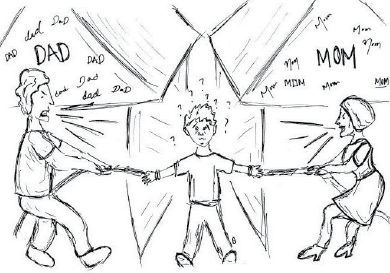South reflects on divorced homes, impacted relationships

Illustration by Grace O’Malley
October 2, 2015
A typical white picket fence home is often portrayed with the two happily married parents, beaming down at their smiling children. Everyone is all together and content in their picture perfect lives. However, for families everywhere, and some students at South, this is not an image that represents their home lives.
Freshman Spencer Wells explained how one aspect of his parents’ divorce that affected him initially and still does today, is his ability to be able to switch back and forth between his parents’ two homes, and being able to adjust to his parents’ varying styles of parenting and rules. Wells said that the hardest adjustment of the divorce four years ago was managing and feeling comfortable in two separate homes with two distinct parenting types.
“When I am at my dad’s, I don’t really have many chores to do, and at my mom’s house it’s the opposite,” Wells said. “The parts at my dad’s house that were more lenient are more strict at my mom’s house and vice versa.”
Another aspect of divorce experienced by children, according to social worker David Hartman, is social isolation. Hartman explained how divorce can sometimes isolate children with joint custody to be fearful of missing potential time with either parent. This is particularly seen with a parent who lives outside of Glenview, according to Hartman, which can put a child at a disadvantage to participate in activities outside of school or with friends during that scheduled time to see the parent.
“If you’re a junior in high school, and want to go to the football game on a Friday, then someone is having a party on Saturday, and a group of friends are going to a movie on Sunday do you have to say no to [spending time with the parent] or no to those things […],” Hartman said.” The pressure that kids feel to take care of their parents by saying yes to the custody arrangements […]. That can come at the cost of [a student’s] social relationships.”
Hartman additionally explained how students who live or see a parent that lives outside of Glenview can sometimes experience difficulties academically. This is evident specifically in regards to homework completion due to not always having the right books or homework needed when visiting a different parent’s home. Junior Natalie Paulson explained how she has a system to organize which course materials she will need, and when she will bring them from her mother’s home in Glenview to her father’s home, which is 30 minutes away.
“For me, I would always just bring [the homework that I needed],” Paulson continued. “Now with the block schedule […] I’d try to go [to my dad’s house] on a day where I don’t have all those classes the next day, so I don’t have to bring all of my books with me. I try to go [to my dad’s house] on a Thursday, so I could only bring half of my books, and just be ready for the next day [of school] again.”
Another aspect of Wells’ parents’ divorce that he dealt with was helping his 10-year-old sister adjust and understand what was going on with their family. Wells explained that while his sister had more trouble dealing with the divorce in the beginning, she was able to adjust faster than he was to their new situation.
“When [my sister and I] found out about [the divorce], she was more sad than I was,” Wells said. “I think when we got more time to adjust [to the divorce, my sister] was able to adjust a lot quicker than I did, because she probably couldn’t remember a time when our parents weren’t divorced, since she was so young […]. It was harder for me to adjust […]. I can see little inconveniences that would not be there if [my parents] weren’t divorced, which is unlike my sister […]. [My sister] doesn’t know what she is missing, but I do.”
For senior Rachel Ramm*, her parents’ divorce of five years has caused her a lot of the times to feel torn. Ramm explained that for her, being caught in the middle between her parents’ arguments is the hardest aspect she has had to deal with throughout and after the divorce.
“I’ve been in an argument with my dad about softball, and he’ll say something like, ‘Well I come to all of your games, but your mom doesn’t, or my mom will say something like, ‘Your dad didn’t listen when you said this,’” Ramm explained. “It’s just little comments that get slipped in really fast, trying to get the upper hand. I feel like [my parents] are almost trying to win our love, or which parent is going to be the favorite, which is hard to have to listen to. I just want to be able to split it. I don’t want to have to choose favorites.”
Wells additionally stated that although his parents’ divorce was not a positive experience, he did gain some new positive insight from his situation. According to Wells, the divorce helped him be able to be more empathetic towards other students in a similar situation to his. In addition, Wells’ parents’ divorce also strengthened his relationship with his younger sister.
“I think that I’ve really gained an understanding of situations like [my own],” Wells said. “I’m closer with my sister than I otherwise would have been. I would be with [my sister] most of the time whereas either one of my parents are only with her about half of the time.”


